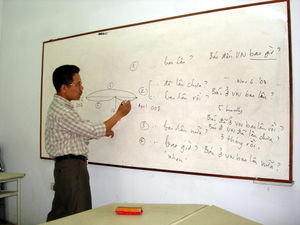Advertisement
Published: April 25th 2008

 Professor Hien Pham
Professor Hien Pham
Trying to get my tenses, past, present and future correct.The Vietnamese language is a tonal language. In Vietnam there are three distinct dialects. The Northern dialect is the official dialect of the whole country but there is also the Central and Southern dialect. Vietnamese tell me that they can understand each other when they speak different dialects but I also remember Ngat Dao, an honor student, graduate of a six year university telling me she could only understand 60 % of what people were saying in Central Vietnam. She was from a Northern family and grew up in the south.
The language can be beautiful depending on who is speaking. However, most Vietnamese I hear talking talk loud and not very pretty. Alexandre de Rhodes the Jesuit
Priest who is credited with at least helping invent the present Vietnamese writing called Quoc Ngũ wrote in the sixteenth century that as he was walking through the rice fields listening to the women talk it sounded like music.
I remember being in Trang’s mother’s house in HCMC and listening to the women in the kitchen preparing a meal and how beautiful they sounded talking softly. Then, one started singing and one by one they all participated. It was beautiful to

 Painting on wall
Painting on wall
Donated by a studenthear.
Their language I believe is the key to why most Vietnamese like to sing and sing beautifully. At Oanh’s wedding I remember all her Uncles getting up on stage and singing so good..
I have a theory that they are good singers because from day one they are listening to the tones of their language. Consciously or unconsciously they learn to listen for and imitate tones so they can speak
To speak English you can say a word many ways and still be understood. Not Vietnamese. If you speak the wrong tone you are either not understood or worse yet you have said another word, sometimes with disastrous results.
As I set around the coffee shops listening to Vietnamese talk so fast I have a great appreciating for the human brain that can compute all of this with understanding.
I believe my wife could learn Vietnamese much easier than me because she is a musician with what they call “perfect pitch.” She listens for tones. She can be in another part of the house and hearing me play the piano she will yell out: “B flat, B flat.” Sometime I can’t even tell when

 History Museum
History Museum
The school was right next to the History Museum. One of Hanoi's most stuning architectural showpieces. Built between 1925-32 by French architect Ernest Hebrard. A blend of French and Chinese design.I hit the wrong note.
Two of my children were violin players. They learned to play using the Suzuki method. This was a method to learn to play the violin by Shinichi Suzuki which was a totally different way to learn to play the violin. Suzuki reasoned that people think the Japanese language is difficult. It is not difficult for people growing up in Japan. Suzuki reasoned that the same lessons in language learning apply to learning to play musical instruments. Using his method you did not learn to play looking at sheet music. Instead, you learned to play “Twinkle Twinkle Little Star.” by ear. Suzuki players were easy to listen to from day one. They were easy to listen to because they had learned to make the right tone and listen to what the correct tone was. Students did not move on to another piece until they mastered Twinkle Twinkle Little Star” with the right tone.
Linda and I took June and Dan to many Suzuki Violin camps. During the final ceremony they may have a 1000 violinist out on a gym floor and they all start off playing Twinkle then they move on to a more
difficult piece. When you can’t play the next piece you have to sit down. Finally they get to the back of the gym where all the “pros” were and they played the final number. It was amazing how good they could make “Twinkle” sound.
Ten Key Elements in Suzuki Philosophy
From an article by Sanford Reuning
1. Begin Early.
Suzuki found that children can learn very well beginning at the age of 3, and in some cases even earlier. Teaching in the U.S. has substantiated this belief and experimentation is constantly employed to see exactly how young children can begin instruction.
2. Learn by Memory.
This is the so-called "mother-tongue" approach. All learning in the early years is without printed music. Children learn by small steps, hence memory is developed in a gradual manner until it becomes a high skill. Young children have an almost uncanny ability to work in this manner, the "natural" manner of language learning.
3. Creative Repetition.
The analogy to language learning is obvious, since the child is encouraged to say the same simple words over and over until they are mastered. Suzuki limits the amount of material
on any given level and encourages much repetition.
4. Active repertoire of pieces learned.
In one's native tongue, one never gets to the point where a word is learned only to be forgotten. The Suzuki student constantly reviews repertoire he has learned, and then effectively reinforces his memory, his technical skill and musical expression.
5. Listening to recordings.
As the mother speaks often to her child, so the violin student hears recordings of the pieces he is to learn and becomes knowledgeable regarding a fine violin, cello or piano tone. This is the environment at home that determines much of his learning.
6. Involvement of Parent.
A parent attends every lesson with the child, encourages him and helps him practice at home each day. The parent becomes the teacher's assistant responsible for playing recordings, encouraging the child, teaching notes, and practicing with the child.
7. Encouragement.
The mother of a small child doesn't scold her infant for mispronouncing words he is learning, but encourages him to repeat it. Likewise, Suzuki parents must always encourage a child. The lessons should be a happy experience.
8. Step-by-step mastery.
Each skill is broken
down into small steps easily mastered by the student. It is imperative that these steps are mastered before attempting the next step, so as to engineer a "built-in" success for each step. This takes skill on the part of the teacher to assess the potential and limitation of learning at a given point in order to effectively challenge the learner.
9. Reading after physical control.
If one uses the analogy of native language learning, one speaks before one learns to read. By no means, however, should memory learning be ignored once one starts to read notes.
10. Every child can learn.
Eliminate the talent test, and believe that they can learn to play the violin or any other instrument in the world.
The Suzuki method is a beautiful practical educational philosophy. It is very different from the piano teacher of old who would rap your knuckles with a stick when you played a wrong note.
I am sure by now you can see how it applies to learning a language.
During Rotary District 5690’s District Conference when I was Governor we had Dr. Rick Gaskill as a speaker. His subject was the human
brain. His presentation was the most popular of all our programs. Those that got to hear Dr. Rick will remember the importance he placed early childhood education. In the field of language learning there has been some very interesting research. In both the Suzuki Method and Dr. Rick’s presentation we keep hearing about the age of 3 and what we do educationally for our child at that age. Yet, we don’t start school until the age of 5. That is a problem!!!!
My language teacher from the linguistic Department of the University of Hanoi, Professor Hein , told me that if you learn 50 words from a native speaker of any language when you are between 3 and 5 you can learn the language at a later date with no accent.
Other research has proven that at age three if you take your kids to a preschool taught by say Chinese teachers exposing your kids to hear nothing but Chinese for a few months, they can later learn Chinese more easily and with all the sounds and tones required. This works for any language..
In Kinsley KS we had a boy named Mitch Brack who was an
exchange student to Germany. He learned German the summer before he went and of course there. When he got back he quizzed out of two years of German at Kansas State University. Talking to Mitch he told me that there were some words that you had to be born in Germany to say right. Mitch missed the three year old expose to German.
I of course missed the three year old expose to Vietnamese and your ability to learn goes down every year until you hit the bottom of the chart at age 18. At age 67, I am off the chart. Looking back for my workbook though I am amazed how much I learned. I will never be where I would like to be with this language but it has already given me some insights I never had of the Vietnamese culture.
I am very thankful to President Nguyen Xuan Vang of Hanoi University for making this program available, my advisor Professor Khoi Van Truong and my teacher Professor Hien Pham.
Advertisement
Tot: 0.062s; Tpl: 0.015s; cc: 12; qc: 28; dbt: 0.036s; 1; m:domysql w:travelblog (10.17.0.13); sld: 1;
; mem: 1.1mb






























the soul cultivator
Claire Hall
FROM: ng°Ýi trÓng trÍt linh hÓn
Kent....LOVED the video, so brave venturing within these streets on two wheels with no motor! And another fine web log of work. You are the voice of Vietnam!!